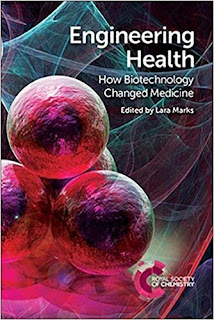Novedad bibliográfica: Engineering Health: How Biotechnology Changed Medicine
Editor: Lara Marks
 Biotechnology harnesses cellular and biochemical
systems to advance knowledge of the molecular cause of disease and to
provide new diagnostic tools and more precisely targeted drugs. Within a
decade, global investment in medical biotechnology has increased more
than ten-fold, resulting in therapies for previously untreatable
conditions. But what exactly is biotechnology and what are its origins?
What further benefits to human health could it offer in the future?
Biotechnology harnesses cellular and biochemical
systems to advance knowledge of the molecular cause of disease and to
provide new diagnostic tools and more precisely targeted drugs. Within a
decade, global investment in medical biotechnology has increased more
than ten-fold, resulting in therapies for previously untreatable
conditions. But what exactly is biotechnology and what are its origins?
What further benefits to human health could it offer in the future?
Written
in an accessible style, contributors to this book explore the history
behind different biotechnology tools, how they are used, and how they
are reshaping the future of diagnostics, therapeutics and vaccines.
Among the technologies examined are genetic engineering, DNA sequencing,
monoclonal antibodies, stem cells, gene therapy, cancer immunotherapy
and the most recent newcomer - synthetic biology.
Applying
new biotechnologies in medicine is not without great challenges. As
medicines shift from small organic molecules to large, complex
structures, such as therapeutic proteins, drugs become difficult to
make, administer and regulate. This book will intrigue anyone interested
in medicine and how we have been, and may continue to, engineer better
health for ourselves. Such changes have major implications for how and
where drugs are manufactured, the cost of medicine and the ethics of how
far society is prepared to go to combat disease.
Book content
- Introduction: Biotechnology—An Ever Expanding Toolbox for Medicine
- Biopharmaceutical Proteins: The Manufacturing Challenge
- Vaccines: The Recombinant Revolution
- Monoclonal Antibodies: A Revolution in the Transformation of Healthcare
- The Changing Fortune of Cancer Immunotherapy
- Gene Therapy: An Evolving Story
- Stem Cells: An Emerging Field for Medicine
- Protein Therapeutics and Blinding Diseases
- Synthetic Biology: A Game Changer?
- Synthetic Biology–Engineering Tomorrow’s Medicines